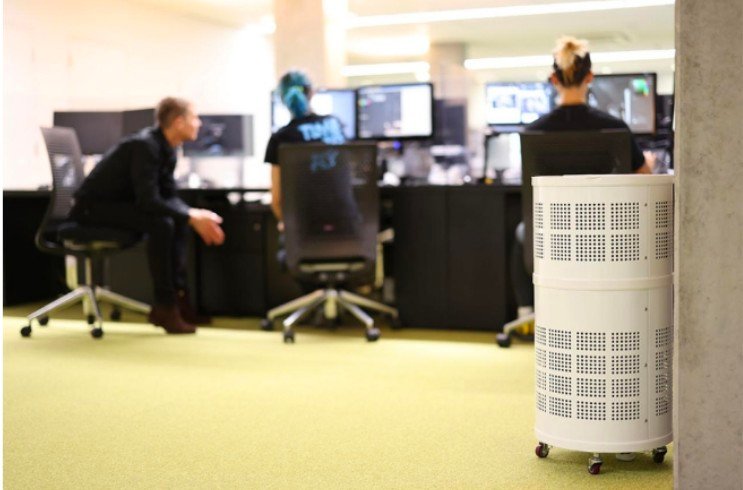Today, Indoor air pollution is a growing concern in commercial facilities, healthcare institutions, real estate, educational institutions, and retail stores. According to the U.S. Environmental Protection Agency, the rising levels of indoor and outdoor air pollution are concerning; indoor air could be five times more polluted than outside air. This occurs because indoor air is not adequately ventilated, exacerbating the contaminants in business spaces.
Now, the question is, how can we combat the sources of air pollution? HEPA air purifier are a great alternative that can remove various indoor air pollutants for the optimal performance of HVAC systems. These devices aim to change your perception of the living environment and transform business spaces.
What is a HEPA Air Purifier
HEPA air purifiers play a significant role in improving indoor air quality. These purifiers are designed to capture airborne particles, including dust, pollen, smoke, viruses, and bacteria, with an impressive efficiency rate of 99.97 per cent. HEPA filters utilise an advanced filtration system that captures particles up to 0.3 microns in size, increasing efficiency and reducing the risk of respiratory problems and allergies.
How HEPA filters Operate
A HEPA filter differs from typical air filters. HEPA filters are mechanical air filters designed to capture indoor air pollutants with a significant thickness. The work includes various parameters such as:
Filtration Mechanism
The U.S. Department of Energy (DOE) has established strict guidelines for HEPA filters, which include a minimum 99.97% capture rate of particles with a size of 0.3 microns. This covers both larger and smaller particles from the commercial spaces and keeps them safe & hygienic.
Utilise a Multi-Stage Filtration Process
Modern HEPA purifiers come with a multi-stage filtration process that includes HEPA filters, Pre-filters, & Activated carbon filters.
HEPA Filter
HEPA Filters trap 99.97 per cent of particulate matter, including dust, pollen, mould, viruses, and bacteria.
Pre Filters
Pre-filters eliminate larger particles such as dust, hair, insects, pollen, and different types of fibres from the air before they reach the primary filter.
Activated Carbon Filters
Activated carbon air purifiers are a very efficient way to enhance indoor air quality and eliminate smells, VOCs, and contaminants. They are an affordable solution to guarantee clean air in your house or business because of their lengthy lifespan.
Diffusion, interception, and impaction are the three methods for collecting air particles as they pass through the air filter. When gas molecules smaller than 0.1 microns collide in a HEPA filter, diffusion occurs. The following mechanisms will be in process. When airborne particles adhere to a fibre, this is known as interference. The third method is impaction, in which the larger air particles embed themselves into the fibres.
Benefits of HEPA Air Purifiers
Let’s explore the benefits of incorporating HEPA filters into commercial spaces.
Eliminating Harmful Particles
HEPA filters equip a thick network of fibres to catch particles as small as 0.3 microns with an astonishing 99.97% efficiency rate. By eliminating contaminants from the air, these filters lower the risk of respiratory issues and allergies.
Mitigate Health Risks
Airborne contaminants negatively impact people’s health and maximise the chances of respiratory problems. Investing in HEPA filters helps create a safer atmosphere by reducing exposure to hazardous particles and the spread of airborne viruses.
Affordability & Accessibility
HEPA filters are affordable and available in a variety of sizes. They can be readily integrated into air purifiers, HVAC commissioning systems, or freestanding devices. With a small investment, we can greatly improve the air quality in our business spaces.
Enhance Indoor Air Quality
Indoor air pollution is as severe as outdoor pollution. HEPA filters eliminate the impure indoor air to promote a healthier interior environment. Cleaner air can help us sleep better, boost cognitive function, and minimise the risk of long-term health problems connected with poor air quality.
Improved Respiratory Health
HEPA filters alleviate respiratory issues and are particularly effective for allergy sufferers. Although they are not explicitly designed to remove odours, many models come with activated carbon filters to absorb unpleasant smells, which contributes to better health and well-being.
Factors to Consider While Choosing a HEPA Air Purifier
When selecting a HEPA air purifier, a few common factors should be focused on the top priority:
Room Size
Choose a purifier appropriate for the size of the room where it will be utilised. Most manufacturers give a square footage suggestion.
CADR Ratings
The Clean Air Delivery Rate (CADR) assesses the purifier’s ability to remove smoke, dust, and pollen. Higher CADR ratings indicate improved performance.
Noise Levels
For enhanced productivity, it is essential to use an air purifier that produces little or no noise. Choose the one that meets your air purification needs and produces less noise.
Filter Replacement Costs
When selecting a purifier, examine the price and frequency of filter replacements. Some versions feature durable filters, while others could need more frequent frequency adjustments.
Conclusion
HEPA smart air purifiers are an excellent investment for better indoor air quality. They can significantly reduce airborne contaminants, which can help create a healthier living space. When selecting the HEPA air purifier for your organisation, take into account variables including room size, CADR ratings, and maintenance requirements.

